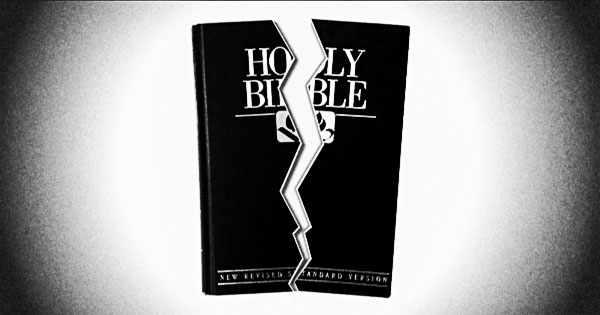
The charge of Marcionism is often leveled toward anyone who says that “God is just like Jesus,” who rejects the violence depicted in the Old Testament, and who insists that Christianity is centered on the ideas of peace and reconciliation. This accusation is a form of the straw man logical fallacy, in which someone’s position is misrepresented in order to make it easier to attack and refute.
To understand why the charge of Marcionism is fallacious, let’s begin by taking a brief look at Marcion and his beliefs. Then, we will compare that system with what I, as a Girardian, believe, to see if the two belief systems are synonymous, or if the Marcionism accusation is grossly misguided.
Marcion of Sinope (c. 85 – c. 160 CE)
Though there are a number of reasons why Marcion was an important figure during the second century, he is now primarily remembered as the arch-heretic of the early Church because he rejected the God of the Hebrew Scriptures. Why would he do such a thing? Because Marcion could not reconcile the violence of the deity in the Jewish Bible with the nonviolence of Jesus Christ. Marcion asked the correct questions regarding divine violence, but he didn’t come to the correct conclusions. Instead, he arrived at dualism, where the Hebrew God was more like a demiurge, subservient to the New Testament Father of Christ.
As an unabashed Girardian, I completely reject this view. I don’t reject the God of the Hebrew Scriptures, only some of the theology espoused by Old Testament writers. For instance, the writer of Deuteronomy 28 paints the following picture of God:
- Deut 28:15: “If you will not obey the Lord your God by diligently observing all his commandments and decrees, which I am commanding you today, then all these curses shall come upon you and overtake you.”
- Deut 28:20–25: “The Lord will send upon you disaster, panic, and frustration in everything you attempt to do, until you are destroyed and perish quickly, on account of the evil your deeds, because you have forsaken me. The Lord will afflict you with consumption, fever, inflammation, with fiery heat and drought, and with blight and mildew; they shall pursue you until you perish. The sky over your head shall be bronze, and the earth under you iron. The Lord will change the rain of your land into powder, and only dust shall come down upon you from the sky until you are destroyed” (emphasis mine).
- Deut 28:59–61: “The Lord will overwhelm both you and your offspring with severe and lasting afflictions and grievous and lasting maladies. He will bring back upon you all the diseases of Egypt, of which you were in dread, and they shall cling to you. Every other malady and affliction, even though not recorded in the book of this law, the Lord will inflict on you until you are destroyed.”
But Jesus shows us how to reorient the theology behind these passages. For example, in John 9, Jesus’ disciples assume a blind man is a sinner (or that his parents are), because no blind man is in God’s good graces (see also Exod 15:26). It’s the same type of worldview that Job’s “friends” had. Even the dreaded Pharisees concur with this theology when they accuse the blind man of being “born entirely in sins” (John 9:34).
For Jesus, this understanding isn’t accurate. John 9:3 states: “Jesus answered, ‘neither this man nor his parents sinned; he was born blind so that God’s works might be revealed in him.’” In John 9:7, that good work is shown to be healing and reconciliation, when Jesus cures the man of his blindness. Remember, in the Sermon on the Mount, Jesus subverts the Deuteronomic God, teaching that instead of God drying up the rain on the wicked (Deut 28:25), he sends his rain down on everyone (Matt 5:45), the “wicked” included.
However–and this is a big however!–we are not then chucking out the entire Old Testament, as Marcion did. That is not what Jesus did, nor is it what we are doing. I, for one, simply see the dying, rising, and forgiving Christ as the hermeneutical lens through which we should view the Hebrew Scriptures. I kinda thought that was what being a Christ-ian was all about!
What is striking, then, is that when we do use this Cruciform hermeneutic, we actually see Christ throughout the Old Testament. We see a Christ figure in the Suffering Servant of Isaiah, who is sent to the grave as a wicked man, even though “he had done no violence” (Isaiah 53:9). We witness the themes of forgiveness and reconciliation—themes that pervade Christ’s Gospel (Eph 6:15, Col 1:15–20)—in the story of Joseph and his brothers. In this story, Joseph’s brothers end up bowing to Joseph precisely because he forgives their original treachery. This is significant because it stands in contrast to the idea that reconciliation occurs only when a victim is expelled. Such is the case in the myth of Oedipus, where the city of Thebes is saved from a curse only after the people expel Oedipus from their city. But the Jewish Scriptures get it right, stepping in, saying “hold on just a minute”—mercy and forgiveness are what bring true peace!
That is why we do not throw the Hebrew Bible out. It is inspired (2 Tim 3:16). I know Evangelicals will agree with me there. We just may not agree that every writer of every bit of Scripture had the perfect theological framework to work with. But again, this is hardly Marcionism. Rather, this is taking seriously what Paul calls the “Gospel of Peace” (Eph 6:15). It is putting peace and reconciliation, as achieved through the blood of the cross (Col 1:20), front and center.
This view is nothing new, though, for it was also the view of many early church fathers. Clement of Rome, reminds us “how free from the wrath [God] is towards all his creation.” The Girardian can then help out and comment on why the God of the Old Testament is said to be so wrathful, which I’ll explore further in my next piece. But there’s no need to go all Texas Chainsaw Massacre on the Hebrew Scriptures!
So, before y’all get the urge to liken folks like me, who say God is and has always been like Christ Jesus, to one of the most infamous heretics the Church hath ever known, please reconsider and hear us out. We are probably not as “out there” as it may first seem. In fact, the case can be made that many of us are quite orthodox in our faith. Go figure.
Grace and peace.
Photo by Dan Wilkinson.
 About Matthew Distefano
About Matthew Distefano
Matthew Distefano is the author of All Set Free: How God is Revealed in Jesus and Why That is Really Good News and the forthcoming From the Blood of Abel. He is also a Regular Contributor for The Raven ReView and ProgressiveChristianity.org. You can find him on his website, Facebook, and Twitter.
Leave a Reply